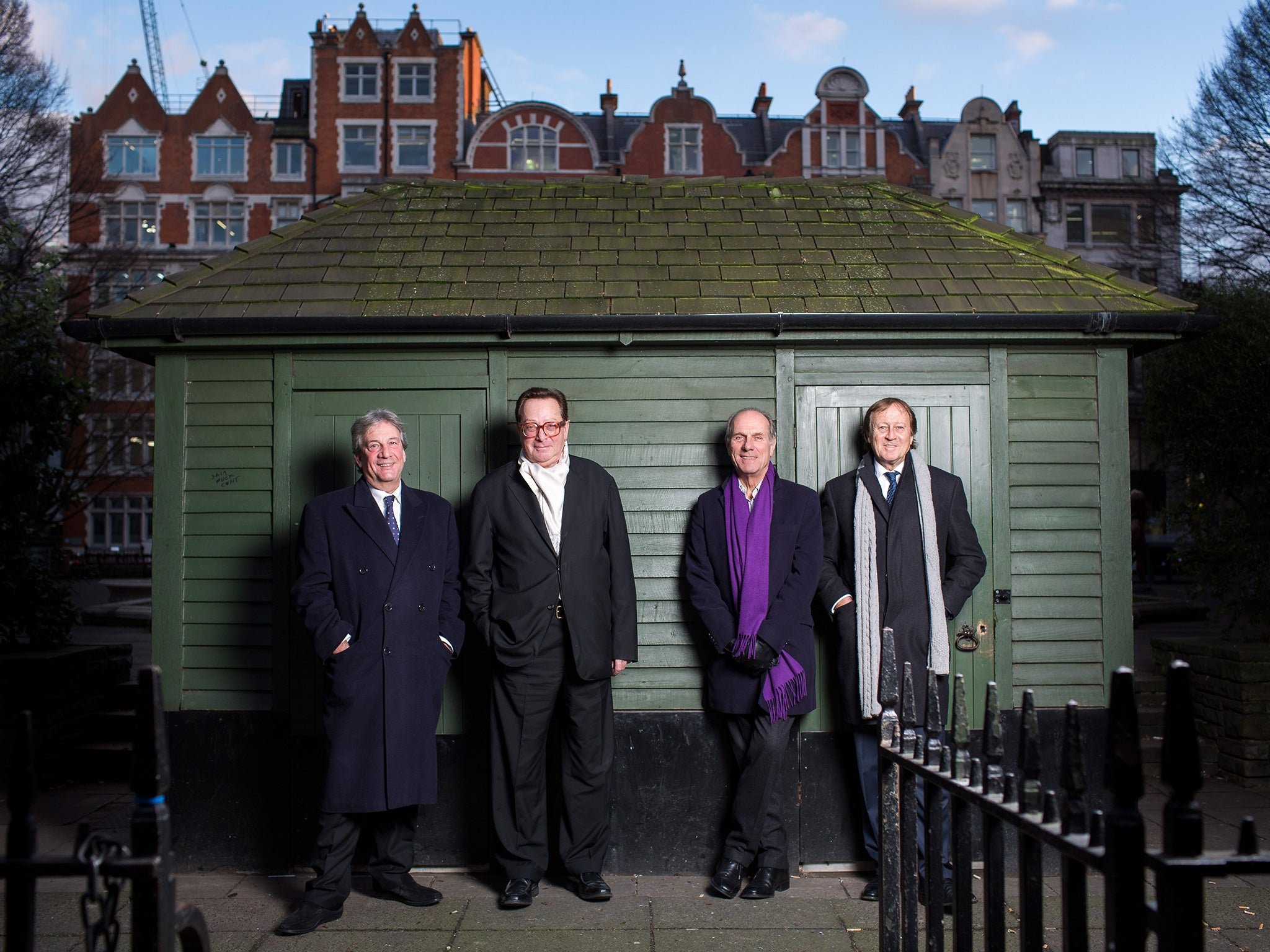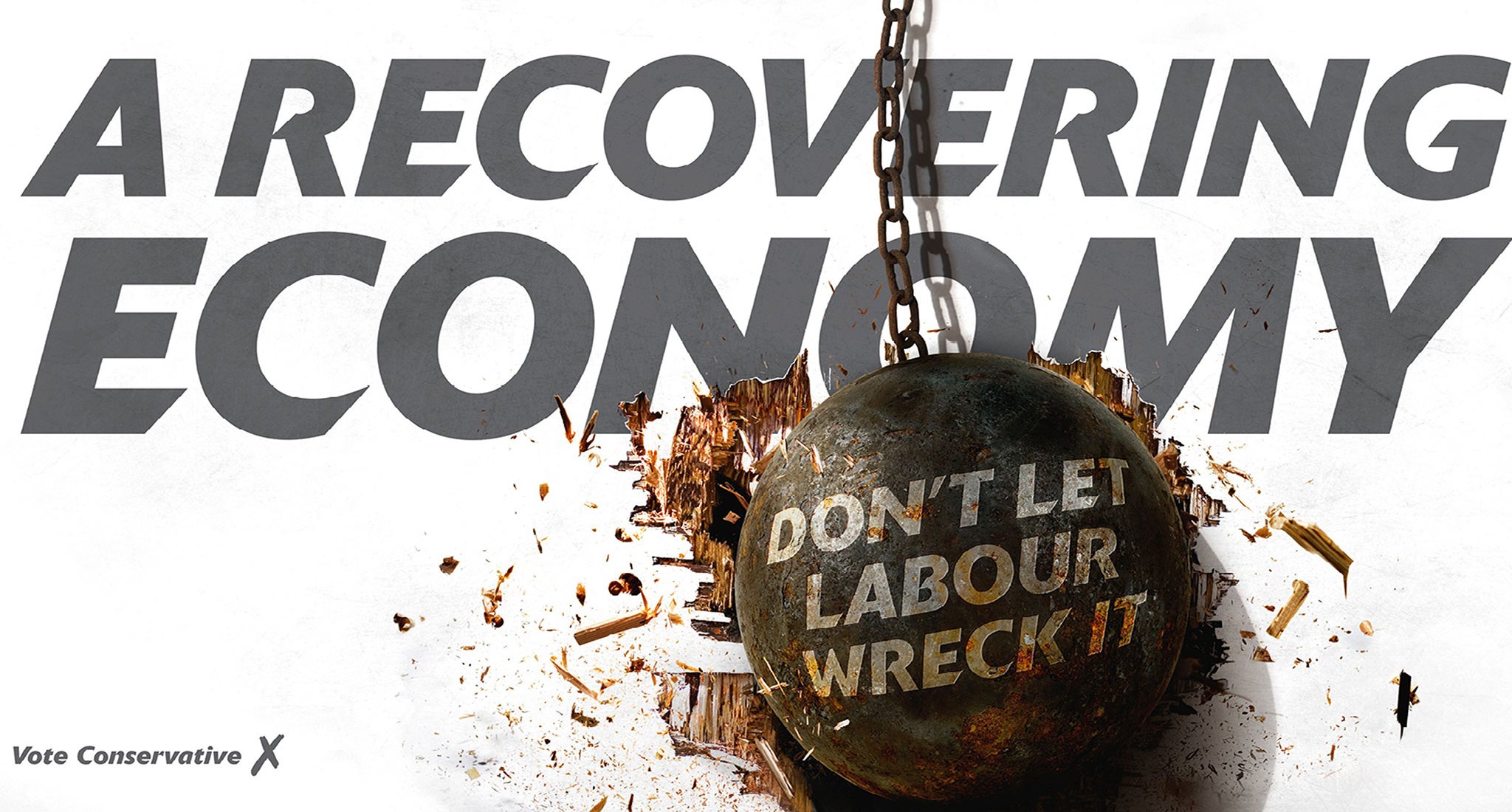M&C Saatchi partners: If you start them up, they’ll never stop
The four old-stagers of M&C Saatchi say they’re like the Rolling Stones – but their Conservative ads show they can still rock the boat

“Don’t you want to know the mystery?” says Lord Saatchi, eyes smiling through his enormous, Harry Palmer-style tortoise-shell spectacles.
“The mystery of why the four of us are together after 40 years? Why this has been an extraordinary corporate story.”
Actually, adds Maurice Saatchi, breaking into an even bigger grin, possibly the most extraordinary story ever in corporate history.
Is he joking, pulling my leg? Maybe, it’s impossible to tell, but here’s why he says they are up there with the greats: “It’s an intellectual answer, and logical. From the beginning we said it is good to be big, better to be good, but best to be both. Big is usually boring, and small can be risky, so it is hard to be big and good at the same time.”
Maurice Saatchi gets up to find me a little black book emblazoned with the title Brutal Simplicity of Thought in the same bold type as the now immortal Conservative party advert – Labour Isn’t Working – and which is the agency’s own logo typeface. “This is what we are about.”
It may be a little book, which started out as a training manual for Saatchi staff, but it’s approach to life is hard–core and has shaped their thinking – starting with the principle that there are only three documents that matter in Western civilisation: Jesus Christ’s Sermon on the Mount, the Declaration of Independence by the American founding fathers and The Communist Manifesto by Karl Marx.

Tough acts to follow but their clarity is what he says they chase: “We try to avoid waffle, vagueness, flim-flam and platitudes – we are here to make an impact for our clients with brutal simplicity of thought. We are greatly interested in having an impact on the world, and on behalf of our clients. That’s our philosophy.”
Sitting with Maurice Saatchi around the giant glass table on the seventh floor of the M&C Saatchi HQ are his three founding partners: Jeremy Sinclair, Bill Muirhead and David Kershaw, who have now worked together for an astonishing 40 years. (His brother, Charles, left shortly after they started the second advertising agency, to focus on his art.)
If they were a band, Mr Muirhead quips they would be the Rolling Stones. Apart from Mr Kershaw, they are of a certain age yet still performing at loud volume with strict roles to play. Maurice Saatchi is the brilliant corporate philosopher – probably bass guitarist –who saw in the early 1980s that going global was the only way to build an advertising business, while the thoughtful Mr Sinclair, who is chairman, is the true genius behind the firm’s winning adverts and on lead guitar. Among his hits are the Pregnant Man, the World’s Favourite Airline and most of the Conservative Party’s most memorable ads.
Without doubt, Mr Muirhead is the singer – the charming Australian front-man, who is not only a ringer for the Crocodile Dundee star Paul Hogan, but could charm the pants off a crocodile too.
Mr Kershaw, who keeps the show on the road as chief executive, rolls the drums, schmoozes with City investors and, for his pains, supports Arsenal.
Every Tuesday morning at 10 o’clock, the four hold open court at this table for the agency’s weekly meeting with the top ten or so of the Mad Men and Women from the floors below – offices that have the surprisingly gentle air of a lively arts college, rather than mad Madison Avenue.
Mr Muirhead says the dynamic works so well because: “We are equal in everything – salaries, bonuses, shares and the office. Except I’m nearest the toilet.” Or as Mr Kershaw puts it: “There’s huge mutual respect. If one of us wants to do something then we support them – and if they don’t want to do it, well we support them too. It’s a true partnership.”
Each owns 7 per cent of the shares in the AIM-listed agency, with top executives such as Moray MacLennan, Tim Duffy and Lisa Thomas owning another 10 per cent. Senior employees working in the overseas businesses are also given big chunks of shares that can then be transferred into the main company.
Giving staff a stake is essential, says Maurice Saatchi, as they are the ones who will inherit this great name. What’s more, warns Mr Muirhead, if any employee ever forgets to say the Saatchi after the M&C, it’s a CTE – a career terminating event. He’s the joker in the pack too.
In June they will be hosting a big party to celebrate the birth of the new agency 20 years ago after Maurice and Charles were ousted from Saatchi & Saatchi, the agency they founded in 1970 and that they grew into the biggest in the world. The battle was bloody, the aftermath messy, with fights over the Saatchi name involving bitter court cases, and sadness too.
Within days of the brothers going, Messrs Sinclair, Muirhead and Kershaw left, followed soon after by another 50 or so top staff. So did many clients, including top names such as British Airways.
Brutal simplicity may still dominate their advertising work but the way business is run today is brutally different. The old Saatchi & Saatchi grew 90 per cent by gobbling up rivals, says Mr Sinclair, whereas this time the network has grown 90 per cent organically and by backing young talent. Lessons have been learnt. There’s even a new incubator fund – Saatchinvest – which invests up to £300,000 in interesting start-ups such as Citymapper.
Indeed, so persuaded is Maurice Saatchi – who is also chairman of the Centre for Policy Studies think-tank – of animal spirits that he wants the Government to scrap tax for small businesses with up to 50 employees in order to get capitalism moving and break up cartels. Marx might be right after all, he believes – that the “end result of competition is no competition”.
As for M&C Saatchi, it’s up there competing with the big boys again. There are 800 employees in the UK, 26 offices around the world, and a total of 2,000 staff. Analysts forecast revenues of around £170m and pre-tax profit up 16 per cent at £17m for 2014. The shares, at 378p, put a value on the agency of around £267m.
Around a third of profits come from traditional advertising, says Mr Kershaw, and another third from customer relationship management and the mobile business, with the balance coming from public relations, sport and entertainment research.
Old-school advertising might be down as a proportion of the business but none of them believe it’s dead, despite the growth of social media. Clients still need strong messages, says Mr Sinclair. “Ads will never die. They just change their shape and form and pop up in different places.”
New clients include Ikea, Royal Bank of Scotland, Etihad, BASF, Virgin and Twitter, but there are familiar names from the past too, such as BA and, of course, the elephant in the room, the Conservatives.
Not surprisingly, they don’t want to say too much about the upcoming election, or the typically ballsy poster campaign launched by the Tories this week – and once again conceived by Mr Sinclair’s creatives. The posters are pure Saatchi attack-dog: Labour’s name is on a huge wrecking ball hanging on a chain hitting the wall of economic recovery; that the ad is from the Conservatives is barely visible.
Mr Sinclair, who has worked on nearly every Tory campaign since Margaret Thatcher’s victory in 1979, will only say: “We are guided by Admiral Jack Fisher, the First Sea Lord, who said: ‘Hit first, hit hard and keep hitting.’”
Brutal. Simple. Brilliant.
Join our commenting forum
Join thought-provoking conversations, follow other Independent readers and see their replies
0Comments